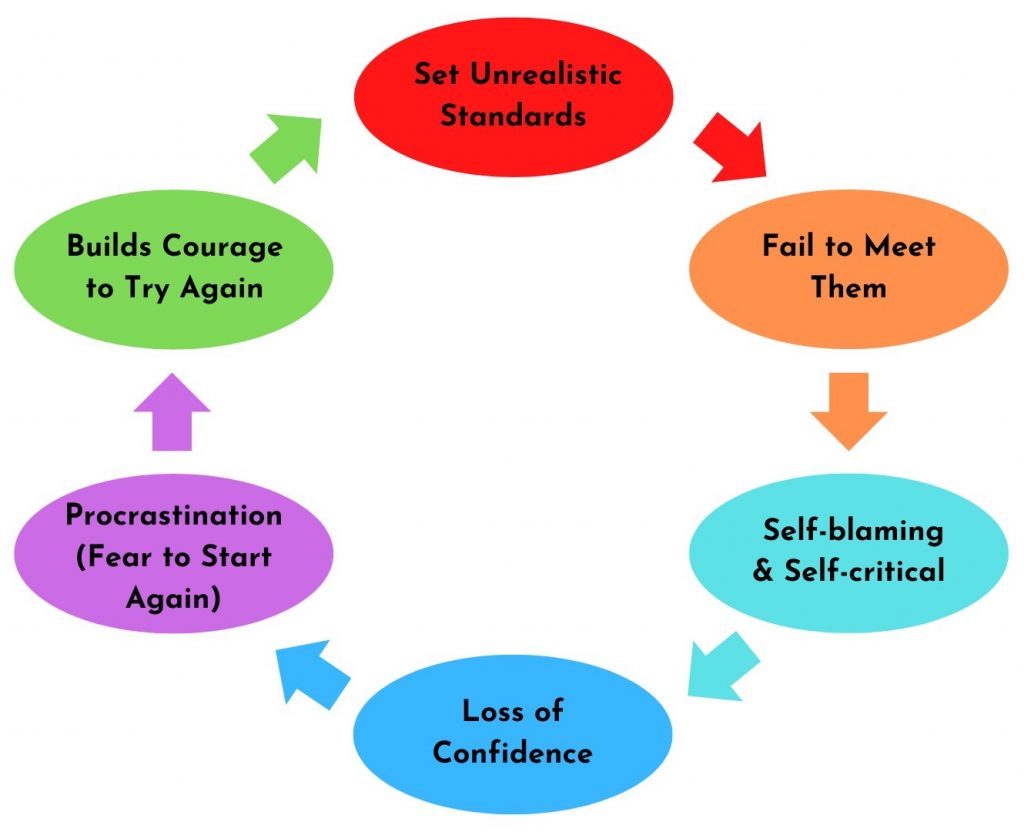As a self-confessed perfectionist, I know how debilitating and paralysing it can be. My own perfectionism has cost me time, caused stress, frustration, and anxiety over the years.
It still can be unless I stay on top of it.
But instead of being caught up the cycle of perfectionism, there is a more mindful way to be. Because like anything in life, once you are aware of it you can take positive action to make a change for the better.
Perfectionism doesn’t have to be an obstacle.
In this article, I’m going to share what helps me to manage perfectionism to prevent it from being an issue in my life. But first, let’s look at the potential causes and consequences of perfectionism.
Let me help you to understand it clearer.
What Causes Perfectionism?

There is no one fit all answer to this. The root cause of your perfectionism could be very different to someone else’s. It could have stemmed from early childhood:
- Perhaps your parents or teachers told you that your work was never good enough. So, you always strived to meet their unrealistic expectations.
- If you had a chaotic or displaced childhood, perfecting your own environment, or work may have helped you feel in control.
- You might have a fear of judgement and disproval from others. This could have developed due to the experiences you faced during your early life.
- Genetics can also play a role. Conditions like OCD are notorious for perfectionist tendencies.
A professional therapist can help to determine the origin of your perfectionism. This can be helpful and empower you with a greater understanding of yourself, but it’s not essential to know.
If you want to loosen the tight grip perfectionism has, it’s the work that you do in the here and now that matters.
The Consequences of Perfectionism

Being perfectionists, we strive for well… ‘perfectionism’ of course. What’s the issue with that? Well, take a look at the cycle of perfectionism diagram I created above.
The first issue is that perfectionists set unrealistic standards, ones that are unattainable. After you try and then fail to reach them, you likely start to blame yourself and be self-critical. That little voice pops up to tell you that you’re not good enough and never will be.
Very helpful right?
This can result in a loss of confidence. You may even feel depressed and defeated. Then you can feel anxious and procrastinate, due to a paralysing fear to start again.
It may take days, weeks, or even months, but you then build up the courage to try again. This cycle ends up repeating over and over again. It’s toxic and debilitating.
Does this sound familiar? I’ve been there many times. So, how do you break out of this cycle once and for all? Well, keep reading and I’ll tell you how.
Develop Self-Awareness
Perfectionists can become plagued with unhelpful and self-sabotaging thoughts. The best way to tackle this is to develop your self-awareness through meditation.
By doing so, you learn to observe your thoughts, rather than allowing them to consume you. The more you recognise your habitual thinking, the better your chances of breaking the perfectionism cycle. Meditation also helps you to be calmer, more present, focussed, and better at regulating your emotions.
If you want to know about the practice and how it works, then please feel free to read my article ‘What is Mindfulness?’.
“As my awareness increases, my control over my own being increases.”
― William Schutz
Challenge Your Thoughts with CBT
CBT stands for Cognitive Behaviour Therapy. It’s a form a psychological treatment that you can do yourself with the help of many apps.
It may sound sophisticated, but it’s simple enough to do. In CBT, you learn to challenge your thoughts, beliefs and attitude. Those towards yourself, others, and the world around you. Why do this?
It’s easy to get stuck in thinking errors and distortions. Not only does this affect productivity, but also your body and wellbeing.
For example, a perfectionist may think ‘if I can’t do it perfectly, there is no point in doing it at all’. This is known as ‘all-or nothing thinking’. Perfectionists also focus on everything that they did wrong, instead of the positives. This is known as ‘negative filtering’.
I can raise my hand to both examples above. I’ve been there, and I know how difficult it can be to break out of that kind of thinking. It’s possible though.
By looking at your thoughts closely with CBT, you will begin to realise how much they are affecting you. You can ten ask yourself ‘is there a different way to think?’. Overtime, you begin to do so automatically. What’s more important, is you’ll no longer take your unconscious thoughts as facts.
Ask Yourself: The Cost Vs Benefit
Ever wonder if a trait of your own behaviour or something external is causing you problems? There’s an effective way to figure it out. Ask yourself, ‘what’s the cost?’ and ‘what’s the benefit?’
When I first asked myself about the cost of being a perfectionist, I answered ‘everything’. It was causing me distress, anxiety, frustration, and procrastination, inhibiting my progress.
What’s the cost for you? Is the cycle of perfectionism also affecting you negatively? Is it limiting your life and contentment?
What about the benefits. Are there any?
Only you know the answers.
For me, I know that being a perfectionism means I create work to a high standard. Meaning I’ve created and worked on projects that I’m proud of.
However, it can become an issue when I allow it to overrule and hinder my life. Especially if I have unrealistic standards and expectations that I can’t meet. Let’s look at how to change these next.
Set Realistic Standards and Goals
Rather than aiming for perfection -which is never attainable- can you set different standards and goals? Ones that are realistic.
If you are learning a new skill or creating something for the first time, is it likely you’ll do it with no mishaps? Even if it’s not something new, is it something easy? Or something that requires skill and years to master?
Get things into perspective. Before starting, reflect on what you’ll be doing, and create some SMART goals. Meaning they should be specific, measurable, achievable, relevant, and time-bound. Doing so will bring clarity and relieve pressure.
Be Kind to Yourself
As much as some of us might hate to admit it, we’re only human. And humans MAKE MISTAKES. This is important because we learn from them, enabling us to grow, develop, and improve.
Ask any successful entrepreneur, professional athlete, musician, or actor. Do you think they all got to where they are without failures?
It’s ok to make mistakes. Seek them out. Embrace and accept them. When they do happen, please remember to be compassionate towards yourself.
This is paramount to living a happier life. Most people -perfectionist especially- are far too hard on themselves. They are self-critical and judgemental, but this is counterproductive. It’ll only increase your reluctance to try things.
It may feel odd or even self-indulgent. But by cultivating self-compassion you can decrease anxiety, depression, and fear of failure. All whilst increasing self-worth, resilience, confidence, motivation, and well-being.
“You’ve been criticising yourself for years and it hasn’t worked. Try approving of yourself and see what happens.”
― Louise L. Hay
Redefine ‘Perfect’
What does ‘perfect’ mean? How do you define it? Can anyone or anything ever be truly perfect? How about asking yourself this. What’s good enough?
How about trying your hardest. Isn’t that good enough? Isn’t that all that you can ask of yourself? Knowing that you showed up. Put in the effort, energy, work, and determination, no matter what the outcome.
Even if you didn’t meet your goals. You tried. That counts for everything. Many people never even attempt to better themselves. They don’t try anything, learn new skills, make, create, or build something from scratch.
Be proud of yourself giving it a go, it’s enough. This is a far more simple, practical, and realistic mindset to have.
You Can Manage Perfectionism
There’s nothing wrong with being a perfectionist. It means you strive for high standards and want to do things well. But it starts to be a problem when it limits and inhibits your life, motivation, goals, and ambitions.
It took me many years to realise how my perfectionist standards were impacting me. Now you have that awakeners too, as well some actions you can take.
There’s no reason why you can’t manage and use perfectionism in your favour too. It can be a superpower if used correctly.
Did you enjoy this article? Is there anything you struggle with when trying to be perfectionist? I’d love to know in the comments.
Take care of yourselves,
Chris from Mindful Way to Be
